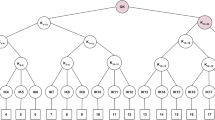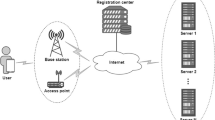Abstract
Securing collaborative applications relies heavily on the underlying group key management protocols. Designing these protocols is challenging, especially in the context of the Internet of Things (IoT). Indeed, the presence of heterogeneous and dynamic members within the collaborative groups usually involves resource constrained entities, which require energy-aware protocols to manage frequent arrivals and departures of members. Moreover, both fault tolerance and scalability are sought for sensitive and large collaborative groups. To address these challenges, we propose to enhance our previously proposed protocol (i.e. DBGK) with polynomial computations. In fact, our contribution in this paper, allows additional controllers to be included with no impact on storage cost regarding constrained members. To assess our protocol called DsBGK, we conducted extensive simulations. Results confirmed that DsBGK achieves a better scalability and fault tolerance compared to DBGK. In addition, energy consumption induced by group key rekeying has been reduced.
Access this chapter
Tax calculation will be finalised at checkout
Purchases are for personal use only
Similar content being viewed by others
References
The Contiki Operating System. http://www.contiki-os.org
Abdmeziem, M.R., Tandjaoui, D.: An end-to-end secure key management protocol for e-health applications. Comput. Electr. Eng. 44, 184–197 (2015)
Abdmeziem, M.R., Tandjaoui, D., Romdhani, I.: A decentralized batch-based group key management protocol for mobile internet of things (DBGK). In: 2015 IEEE International Conference on Computer and Information Technology; Ubiquitous Computing and Communications; Dependable, Autonomic and Secure Computing; Pervasive Intelligence and Computing (CIT/IUCC/DASC/PICOM), pp. 1109–1117. IEEE (2015)
Abdmeziem, M.R., Tandjaoui, D., Romdhani, I.: Architecting the internet of things: state of the art. In: Koubaa, A., Shakshuki, E. (eds.) Robots and Sensor Clouds. SSDC, vol. 36, pp. 55–75. Springer, Cham (2016). https://doi.org/10.1007/978-3-319-22168-7_3
Abdmeziem, M.R., Tandjaoui, D., Romdhani, I.: A new distributed MIKEY mode to secure e-health applications. In: Proceedings of the International Conference on Internet of Things and Big Data, IoTBD, vol. 1, pp. 88–95. SciTePress (2016)
Abdmeziem, M.R., Tandjaoui, D., Romdhani, I.: Lightweighted and energy-aware MIKEY-ticket for e-health applications in the context of internet of things. Int. J. Sens. Netw. (2017, in press)
Balenson, D., McGrew, D., Sherman, A.: Key management for large dynamic groups: one-way function trees and amortized initialization. Internet-Draft, February 1999
Ballardie, A.: Scalable multicast key distribution. RFC 1949, May 1996
Briscoe, B.: MARKS: zero side effect multicast key management using arbitrarily revealed key sequences. In: Rizzo, L., Fdida, S. (eds.) NGC 1999. LNCS, vol. 1736, pp. 301–320. Springer, Heidelberg (1999). https://doi.org/10.1007/978-3-540-46703-8_19
Challal, Y., Seba, H.: Group key management protocols: a novel taxonomy. Int. J. Inf. Technol. 2(1), 105–118 (2005)
Daghighi, B., Kiah, M., Shamshirband, S., Rehman, M.: Toward secure group communication in wireless mobile environments: issues, solutions, and challenges. J. Netw. Comput. Appl. 50, 1–14 (2015)
Di Pietro, R., Mancini, L.V., Jajodia, S.: Providing secrecy in key management protocols for large wireless sensors networks. Ad Hoc Netw. 1(4), 455–468 (2003)
Dini, G., Lopriore, L.: Key propagation in wireless sensor networks. Comput. Electr. Eng. 41, 426–433 (2015)
Dunkels, A., Eriksson, J., Finne, N., Tsiftes, N.: Powertrace: network-level power profiling for low-power wireless networks (2011)
Harney, H., Muckenhirn, C.: Group key management protocol (GKMP) architecture. RFC 2093, July 1997
Kamal, A.A.: Cryptanalysis of a polynomial-based key management scheme for secure group communication. IJ Netw. Secur. 15(1), 68–70 (2013)
Keoh, S.L., Kumar, S.S., Tschofenig, H.: Securing the internet of things: a standardization perspective. IEEE Internet Things J. 1(3), 265–275 (2014)
Kim, Y., Perrig, A., Tsudik, G.: Tree-based group key agreement. ACM Trans. Inf. Syst. Secur. (TISSEC) 7(1), 60–96 (2004)
Lee, P., Lui, J., Yau, D.: Distributed collaborative key agreement and authentication protocols for dynamic peer groups. IEEE/ACM Trans. Netw. 14(2), 263–276 (2006)
Liu, D., Ning, P.: Security for Wireless Sensor Networks, vol. 28. Springer Science & Business Media, Heidelberg (2007). https://doi.org/10.1007/978-0-387-46781-8
Liu, N., Tang, S., Xu, L.: Attacks and comments on several recently proposed key management schemes. IACR Cryptology ePrint Archive 2013:100 (2013)
Mittra, S.: Iolus: a framework for scalable secure multicasting. ACM SIGCOMM Comput. Commun. Rev. 27(4), 277–288 (1997)
Oster, G., Urso, P., Molli, P., Imine, A.: Data consistency for P2P collaborative editing. In: Proceedings of the 2006 20th Anniversary Conference on Computer Supported Cooperative Work, pp. 259–268. ACM (2006)
Patsakis, C., Solanas, A.: An efficient scheme for centralized group key management in collaborative environments. IACR Cryptology ePrint Archive 2013:489 (2013)
Piao, Y., Kim, J., Tariq, U., Hong, M.: Polynomial-based key management for secure intra-group and inter-group communication. Comput. Math. Appl. 65(9), 1300–1309 (2013)
Plaisted, D.A.: New NP-hard and NP-complete polynomial and integer divisibility problems. Theor. Comput. Sci. 31(1–2), 125–138 (1984)
Rafaeli, S., Hutchison, D.: Hydra: a decentralized group key management. In: 11th IEEE International WETICE: Enterprise Security Workshop, June 2002
Rafaeli, S., Hutchison, D.: A survey of key management for secure group communication. ACM Comput. Surv. (CSUR) 35(3), 309–329 (2003)
Setia, S., Koussih, S., Jajodia, S., Harder, E.: Kronos: a scalable group re-keying approach for secure multicast. In: Proceedings IEEE Symposium on Security and Privacy, pp. 215–228 (2000)
Shamir, A.: How to share a secret. Commun. ACM 22(11), 612–613 (1979)
Sicari, S., Rizzardi, A., Grieco, L.A., Coen-Porisini, A.: Security, privacy and trust in internet of things: the road ahead. Comput. Netw. 76, 146–164 (2015)
Sicari, S., Rizzardi, A., Miorandi, D., Coen-Porisini, A.: Internet of things: security in the keys. In: Proceedings of the 12th ACM Symposium on QoS and Security for Wireless and Mobile Networks, pp. 129–133. ACM (2016)
Tang, P.C., Ash, J.S., Bates, D.W., Overhage, J.M., Sands, D.Z.: Personal health records: definitions, benefits, and strategies for overcoming barriers to adoption. J. Am. Med. Inform. Assoc. 13(2), 121–126 (2006)
Veltri, L., Cirani, S., Busanelli, S., Ferrari, G.: A novel batch-based group key management protocol applied to the internet of things. Ad Hoc Netw. 11(8), 2724–2737 (2013)
Wang, W., Bhargava, B.: Key distribution and update for secure inter-group multicast communication. In: Proceedings of the 3rd ACM Workshop on Security of ad Hoc and Sensor Networks, pp. 43–52. ACM (2005)
Wang, W., Wang, Y.: Secure group-based information sharing in mobile ad hoc networks. In: IEEE International Conference on Communications, ICC 2008, pp. 1695–1699. IEEE (2008)
Wong, C., Gouda, M., Lam, S.: Secure group communications using key graphs. IEEE/ACM Trans. Netw. 8(1), 16–30 (2000)
Author information
Authors and Affiliations
Corresponding author
Editor information
Editors and Affiliations
Rights and permissions
Copyright information
© 2018 ICST Institute for Computer Sciences, Social Informatics and Telecommunications Engineering
About this paper
Cite this paper
Abdmeziem, M.R., Charoy, F. (2018). Fault-Tolerant and Scalable Key Management Protocol for IoT-Based Collaborative Groups. In: Lin, X., Ghorbani, A., Ren, K., Zhu, S., Zhang, A. (eds) Security and Privacy in Communication Networks. SecureComm 2017. Lecture Notes of the Institute for Computer Sciences, Social Informatics and Telecommunications Engineering, vol 239. Springer, Cham. https://doi.org/10.1007/978-3-319-78816-6_22
Download citation
DOI: https://doi.org/10.1007/978-3-319-78816-6_22
Published:
Publisher Name: Springer, Cham
Print ISBN: 978-3-319-78815-9
Online ISBN: 978-3-319-78816-6
eBook Packages: Computer ScienceComputer Science (R0)




